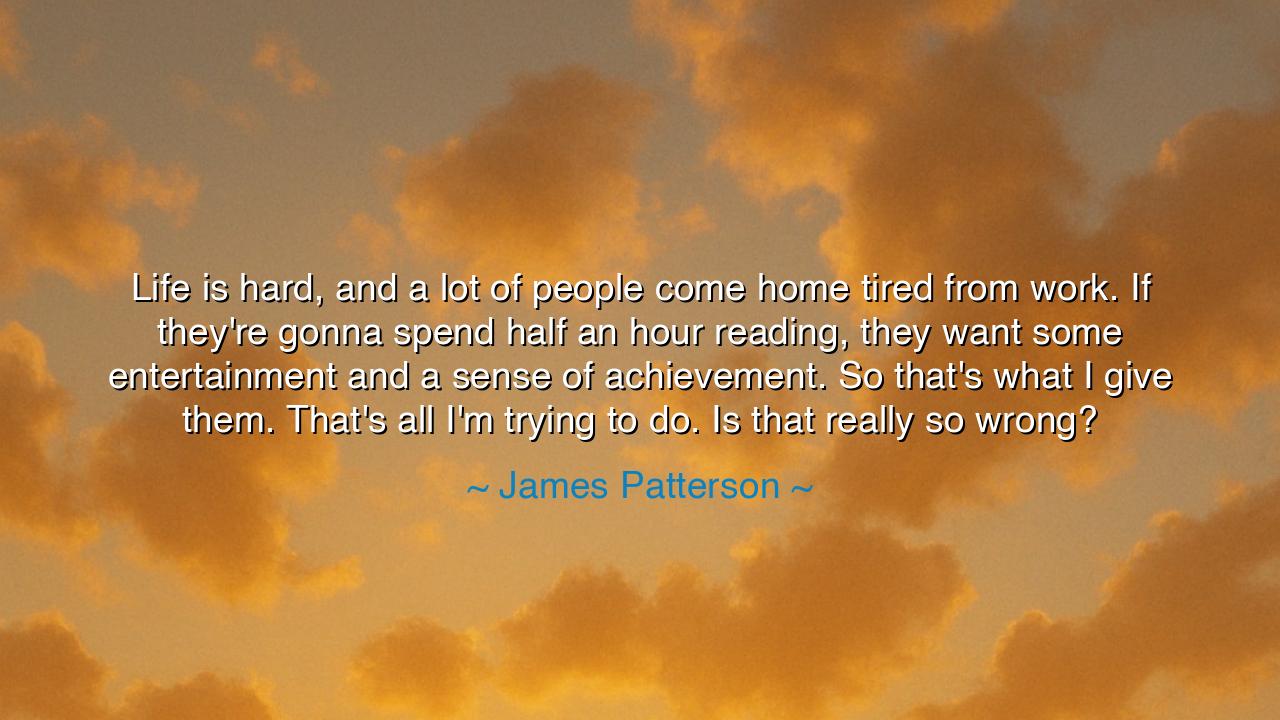
Life is hard, and a lot of people come home tired from work. If
Life is hard, and a lot of people come home tired from work. If they're gonna spend half an hour reading, they want some entertainment and a sense of achievement. So that's what I give them. That's all I'm trying to do. Is that really so wrong?






In the dusk-tinted hours when the city exhales, the writer James Patterson speaks a simple truth: “Life is hard”. This is not the complaint of the idle, but the testimony of a steward who keeps watch by the lamplight for those who come home tired. He does not pretend that the day’s burdens are light; he knows the ache in the shoulders, the grit in the eyes, the quarrel between the clock and the will. And so he offers a humble covenant: if a soul can spare half an hour reading, he will meet them at the gate with entertainment and a sense of achievement. The vow is modest and humane. It says: rest here; drink from this narrative spring; let the story lift you one rung beyond fatigue.
This sentiment has an old root, as old as the campfire and the lyre. When sailors came ashore with salt still clinging to their hair, when harvesters stacked sheaves beneath a crimson sky, there was always a teller who understood. The teller did not sneer at the weary for desiring delight; he braided delight with meaning. He knew that entertainment is not the enemy of virtue but its messenger, sent in a cloak of laughter and danger and love. In the agora and in the amphitheater, the crowd did not ask for lectures—yet they left changed. To offer a tale that can be finished in a single sitting is to place a stone in the hand of the tired and say, “Here—throw this at despair.”
Consider a small, modern story. A nurse returns from the night shift—feet blistered, heart bruised by alarms that would not hush. The apartment is quiet, the kettle sighs, and on the table lies a paperback with chapters that end like stepping-stones across a dark stream. She gives herself half an hour reading. Thirty minutes later, she closes the book not with guilt, but with that bright inner click: finished a chapter, solved a piece of the puzzle, crossed the stream. This is a sense of achievement—not a diploma, not a trophy, but a completed arc in a day that offered her none. When she wakes to face the ward again, the small victory travels with her like a charm.
Or think of an older example: in the 19th century, the serial novel marched into the streets like a friendly regiment. Workers waited at docks for the next installment; families read aloud after supper. Chapters were sized for the hour between toil and sleep, for the single candle’s life. Those authors—Dickens among them—understood what Patterson declares now: that a story paced for the weary does not cheapen art; it democratizes wonder. To craft entertainment that moves swiftly, to shape scenes that resolve, is to honor the brief sovereignty of the reader’s evening.
There are guardians of the gate who ask, with knitted brows, whether such intention “lowers” literature. Patterson answers with a question crowned in gentleness and steel: “That’s what I give them. That’s all I’m trying to do. Is that really so wrong?” The ancients would smile. Was it wrong for the poet to keep his verses memorably shaped for mouths that must speak them after wine? Was it wrong for the dramatist to end a scene with a turn that made the crowd lean forward? Form that respects the reader’s stamina is not pandering; it is hospitality—the highest rhetoric of care.
Let us weigh the sentence “Life is hard” as a philosopher might weigh a coin. On one side: the hardness itself, undeniable. On the other: the response. Many answers are cruel—distraction that dulls, noise that scatters. But a swift, lucid tale can be a kindly blade: it cuts the day’s knot without cutting the reader’s dignity. It gives the weary not escape but return—the chance to come back to themselves with breath steadier, eyes clearer. The sense of achievement is the quiet proof that the soul still moves under its own power.
What then is the lesson for us, listeners by the evening fire? First, despise neither entertainment nor ease of entry. Judge a story not by how difficult it is to begin but by how deeply it carries you once inside. Second, let your own labors—whether writing, teaching, serving—be shaped with compassion for human limits. Ask: can someone who comes home tired take this in and be strengthened? Third, honor the half hours. They are the gold dust of our days. Fill them with chapters that conclude, calls that are returned, prayers that are finished, walks that reach the corner and back.
Practical steps follow like footprints in wet sand. Curate a “half-hour shelf” at home: books with brisk chapters and purposeful momentum, stories that yield a small victory each sitting. Set a lamp by your favored chair, and defend that light as you would a hearth. If you create—words, songs, services—design them with thresholds wide enough for the weary to cross. And when the voice of scorn asks if such kindness is a fault, answer with Patterson’s own measured courage: “That’s what I give them.” For in giving rest to the reader, you practice an ancient craft—making the road easier to walk, so that tomorrow’s burdens may find us readier, steadier, and, by grace, still moving forward.






AAdministratorAdministrator
Welcome, honored guests. Please leave a comment, we will respond soon